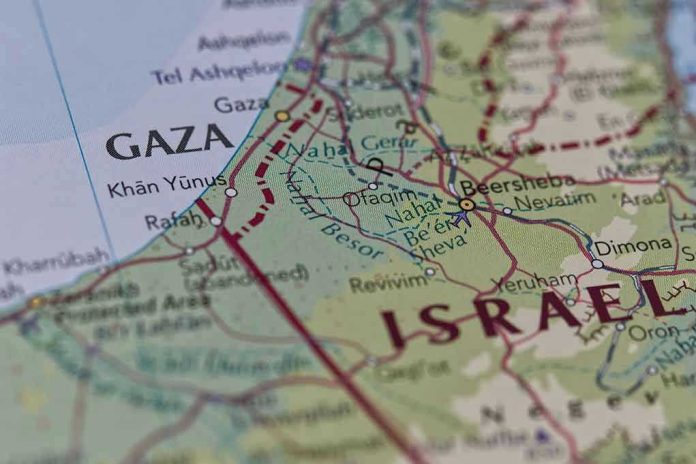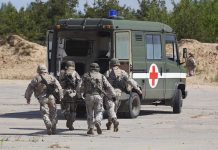
Masked figures unleashed chaos in the West Bank, setting fire to lives and igniting questions that cannot be extinguished by silence.
Story Snapshot
- Masked Israeli settlers attacked Palestinian villages, targeting property and vehicles.
- Israeli soldiers arrived and clashed with the settlers during the rampage.
- The violence highlights persistent tension and fragile security in the occupied West Bank.
- Both Israeli and Palestinian officials confirmed the gravity of the attacks.
Masked Settlers Bring Fear and Flames to West Bank Villages
Dozens of masked Israeli settlers descended on two Palestinian villages in the occupied West Bank, unleashing a wave of violence rarely witnessed even in this chronically volatile region. Vehicles and other property became fuel for fires set by the attackers, who moved with alarming coordination and apparent impunity. The scene, as described by both Israeli and Palestinian officials, was one of rapid escalation—villagers caught off guard, property torched, and the unmistakable stench of fear lingering in the aftermath.
The attackers, their faces hidden, reportedly arrived in groups, quickly overwhelming any sense of normalcy. As flames consumed vehicles and smoke billowed over the landscape, the purpose of the violence became painfully clear: intimidation and collective punishment, a message delivered with matches and masked faces. Villagers scrambled for safety, their attempts to protect what little they had proving futile against the marauding crowd.
Israeli Soldiers Respond, but Chaos Reigns
Israeli soldiers arrived on the scene, tasked with halting the rampage. Instead of restoring order, their presence sparked fresh clashes—not with the Palestinians, but with the Israeli settlers themselves. This unexpected confrontation exposed not only the depth of the animosity but also the fractured nature of authority in the West Bank. Soldiers struggled to contain the violence, reportedly engaging in physical confrontations with the settlers as they tried to push them back and extinguish fires.
Villagers, watching the spectacle unfold, saw little comfort in the belated arrival of military forces. The damage had already been done—vehicles incinerated, livelihoods threatened, faith in basic security eroded. The clash between settlers and soldiers underscored a troubling reality: the lines between law enforcement and lawlessness are sometimes as blurred as the smoke hanging over the torched villages.
Political Ramifications and Underlying Tensions
The attacks come amid a period of heightened tension in the occupied West Bank, where the struggle over land, identity, and security remains unresolved. Israeli and Palestinian officials alike acknowledged the gravity of the violence, with each side pointing to the broader context of occupation, settlement expansion, and the near-daily friction that defines life in the region. These episodes are not isolated; they echo a cycle of reprisals and retaliation that has made peace seem perpetually out of reach.
Local leaders warned that such attacks deepen mistrust and harden attitudes on both sides. The appearance of masked settlers—unidentifiable, unaccountable—feeds a narrative of impunity and emboldens further acts of vigilantism. The involvement of Israeli soldiers, instead of quelling the violence, became another layer of complexity in a situation already fraught with suspicion and division.
What the Attacks Reveal About Control and Security
These brazen attacks force a reckoning with the question of control in the West Bank. If Israeli soldiers cannot prevent settlers from attacking Palestinian villages, what does that say about the rule of law? For conservative American readers, the episode raises uncomfortable parallels: what would happen if masked mobs attacked communities in the United States and law enforcement was unable or unwilling to stop them? Property rights, personal security, and the sanctity of the home—values often regarded as sacrosanct—are under threat in these villages.
The enduring lesson may be that peace and order cannot thrive where accountability falters. Masked attackers may disappear into the night, but the scars they leave behind—burned vehicles, shattered trust, traumatized families—remain. For now, the villagers in the West Bank face the aftermath not just of a single night’s violence, but of a system that struggles to ensure justice and security for all who live under its shadow.
Sources:
Israeli settlers torch West Bank mosque and scrawl hateful messages after military condemnation




